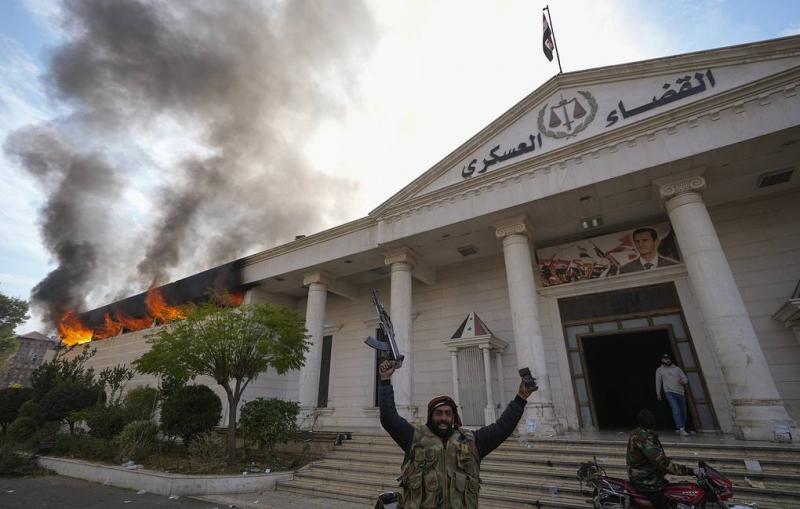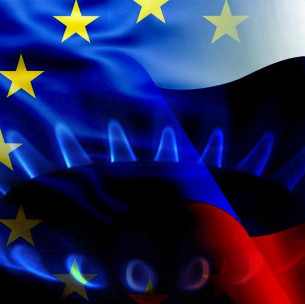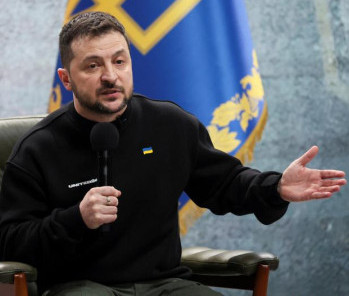
- Press review: Israel and Hamas near a truce while Zelensky drafts a new negotiation plan
- Press review: Who benefits from Russian general's murder as Trump lacks Kremlin strategy
- Press review: EU imposes new anti-Russian sanctions and Russia braces for NATO conflict
- Press review: South Korean president impeached as Ukraine turns to foreign mercenaries
What’s next for Syria, US President-elect Donald Trump calls for ceasefire in Ukraine, and no talks on continued Russian gas transit to Europe. These stories topped the headlines in Monday’s newspapers across Russia, according to TASS news agency.
Media: What lies ahead for Syria after takeover of Damascus
Russia is in touch with the Syrian opposition that took control of Damascus, the Russian Foreign Ministry stated on December 8. The diplomatic agency remarked that following talks with parties to the conflict, Bashar Assad left the presidential office and the country, "having given instructions to transfer power in a peaceful way." Meanwhile, combat in Syria continues. The Syrian National Army (SNA), backed by Turkey, launched attacks on Kurds in the country’s north. Israel also carried out strikes against Syria, having deployed its forces in the buffer zone in the Golan Heights. Experts polled by Izvestia expressed doubts that events in Syria will unfold peacefully. In their view, opposition groups are unlikely to reach common ground in their quest for power and resources.
"Along with Hezbollah, Syria was an important link in Iran’s ‘Axis of Resistance.’ Through agreements with Bashar Assad, Iran could extend its influence over the entire Middle East. The fall of Damascus is a loss for Tehran and its capabilities in the standoff with Israel. In this sense, Israel benefits from Iran leaving Syria and the weakening of Hezbollah. That said, it is clear that an Islamist-ruled Syria next door is not the best neighbor to have," analyst Tigran Meloyan from the HSE Mediterranean Studies Center explained to Izvestia.
He did not rule out that destabilization in Syria may trigger the influx of militants from Katibat al-Tawhid wal-Jihad (outlawed in Russia), Hayat Tahrir al-Sham (HTS), and related groups to Central Asian and Caucasus countries, which will undoubtedly create an additional burden on Russian agencies controlling migration flows.
An interim government, controlled by the HTS, is likely to be created in Syria, Program Coordinator at the Russian International Affairs Council Ivan Bocharov told Vedomosti. The expert did not rule out the possibility of a more inclusive cabinet of ministers being formed, even though the HTS is unlikely to be willing to share power with other forces. "At least, representatives from friendly groups, such as the SNA, as well as some of Assad’s officials, may become part of the interim government. It is also possible elections will be held, monitored by the HTS," the expert said.
Syria will not be able to create a united government while the country risks repeating Iraq’s fate, said Alexander Krylov, a professor with the Department of Asian and African Studies at MGIMO University. "Now it will be split into approximately three parts, if not more, because Syria has many more autonomous communities than Iraq, such as the Druze and Kurds," he explained in a conversation with Vedomosti.
Nezavisimaya Gazeta: Trump urges Putin, Zelensky to immediate ceasefire
US President-elect Donald Trump has stated that Ukraine is eager to negotiate peace with Russia and called on Russian President Vladimir Putin to initiate discussions with the Kiev regime. This took place shortly after Trump met in Paris with French President Emmanuel Macron and Vladimir Zelensky. The meeting was not particularly positive for Zelensky, but the current peace terms may not be acceptable to the Russian side either.
"According to the media, Trump was not particularly enthusiastic about meeting with Zelensky, but his advisors insisted that it was necessary. It is notable, however, that the conversation between the presidents was relatively brief," said Andrey Sidorov, head of the World Politics Department at Moscow State University. In a conversation with the newspaper, he highlighted that Moscow and Kiev still have major differences of opinion.
"It will be challenging for Ukraine to accept the loss of territories, while sanctions from Russia are unlikely to be lifted even if peace is reached. But in any case, the truce is fraught with the ‘flooding’ of weapons into Ukraine, with the population holding revanchist sentiments. Right now, the sides are attempting to devise a peace formula. That said, it was Ukraine that had been avoiding talks," the expert pointed out.
Sidorov added that, in the event of a truce, the West may do something it has not done until 2022: train the Ukrainian military to use Western arms.
Izvestia: No talks between Russia, Ukraine on extending gas transit to Europe
Russia and Ukraine are not holding negotiations on extending the agreement on gas transit to Europe, Russian Deputy Prime Minister Alexander Novak informed Izvestia. Meanwhile, the agreement expires at the end of December, and it is unclear whether this means the complete cessation of gas deliveries via Ukrainian territory. Stopping the transit of pipeline gas threatens the energy security of European countries, primarily Austria and Slovakia, experts believe. EU countries will have to increase spending on buying gas, mostly LNG, from Russia. Additionally, analysts forecast that if gas transit via Ukraine stops, gas prices in Europe may soar in early 2025.
Igor Yushkov, a leading analyst at the Financial University under the Government of the Russian Federation, agrees. "There will be a shortage of gas and a price hike. Yes, later the situation will stabilize and Europe will again reduce consumption, as it did in 2021-2022. The period of high prices triggered a drop in consumption by approximately 90 billion cubic meters per year. So it’s not that they replaced most of Russian gas, but simply reduced consumption, mostly in the industrial sector," he told Izvestia. "There was a wave of de-industrialization - enterprises cannot afford to buy gas at such high prices and remain profitable," he added.
"Austria and Slovakia will be hurt the most. They are landlocked, so they will have to buy LNG because pipeline deliveries are at their limit, both from Azerbaijan, Algeria, and Norway. They will have to deliver LNG to a littoral state, for example, Croatia, pay for regasification, and pumping to their territory, which will be expensive," Yushkov noted. "Slovakia will also lose money due to lost transit to Austria," he pointed out.
"If we are ruling out transit via Ukraine, Moldova theoretically can use the Trans-Balkan pipeline. Yet, there is a question of whether it has enough capacity to satisfy demand," Alexander Frolov, Deputy Director General of the Institute of National Energy told Izvestia. "Another thing is that Moldova is not a major consumer; it needs about 3 billion cubic meters a year, with about 60% of this volume consumed by Transnistria. However, if Tiraspol won’t receive any gas, Chisinau won’t get any electricity from the power stations located in Transnistria," he explained.
Nezavisimaya Gazeta: Belarus to receive Oreshnik as security guarantee
On Sunday, the 25th anniversary of the signing of the Treaty on the Creation of a Union State of Russia and Belarus was observed. On this occasion, Belarusian President Alexander Lukashenko officially congratulated the people of Russia and Belarus. He received a very substantial gift on this anniversary - Russian President Vladimir Putin honored his request to deploy the new Oreshnik hypersonic intermediate-range ballistic missile on Belarusian soil. The Belarusian General Staff even announced that the republic is ready to participate in the further development of this weapon. Experts believe that this move will complicate Lukashenko’s plans to foster ties with the West.
On Saturday, Deputy Chief of the General Staff of the Belarusian Armed Forces Sergey Lagodyuk reported readiness to address any tasks related to Oreshnik’s deployment.
This decision triggered mixed reactions among experts. Naturally, those supporting the Belarusian government welcomed it. However, opposition political scientist Valery Karbalevich, analyzing the results of talks between the Russian and Belarusian leaders, commented on one of Western web resources: "The most important decision is the deployment of Russia’s newest Oreshnik system in Belarus." That said, the analyst thinks that this will complicate the process of restoring ties with the West for Lukashenko, which he clearly desires. "Belarus finds itself on the frontline in a geopolitical standoff with the West. Possibly, he thinks that this increases the country’s political weight. Yet actually, he is reinforcing his country’s global image as Russia’s vassal and seriously undermines any possibility of unfreezing relations with the US and EU," the expert concluded.
Izvestia: US benefits from creating war risks, Chinese envoy says
China urges collaboration against the US’ attempts to provoke a conflict and an arms race in the Asia-Pacific region (APAC), Chinese Ambassador to Russia Zhang Hanhui told Izvestia. According to him, Washington is forcefully promoting the deployment of Typhon missile systems, which are stationed in the Philippines indefinitely. That said, the systems located on Luzon island are capable of striking targets in the Taiwan Strait, the South China Sea, and China’s economically developed eastern regions, while their missiles may be outfitted with nuclear warheads.
"The US’ actions may be interpreted as a step backward in history, provoking a standoff between military blocs, strengthening military alliances, and disrupting the strategic balance in the region. This has created new tensions and confrontations. Such actions may trigger a ‘broken windows’ effect, facilitating the spread of intermediate-range missile technologies among allies and opening the ‘Pandora’s box’ for the deployment of strategic forces and arms in the Asia-Pacific region. As a result, this region may be drawn into an endless arms race," the envoy warned.
"The Asia-Pacific region needs peace and development, not conflicts and standoffs. Some countries, trying to preserve their positions, create chaos for their personal gain and incite conflict every time other regions aspire for improvement and development. In recent years, the US has been profiting from creating the risks of war, which leads to constant conflicts and humanitarian crises in the affected countries," the diplomat concluded.
TASS is not responsible for the material quoted in these press reviews









